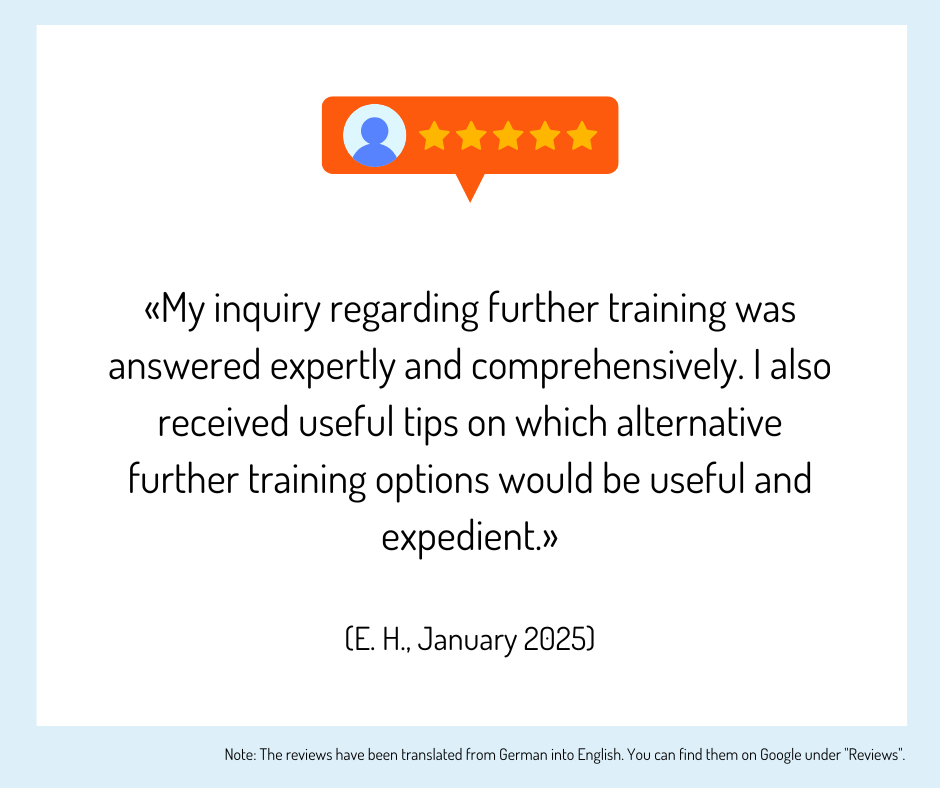Tutoring languages (Region Bern):
1 Provider
Sofort zur richtigen Weiterbildung
Education location / Schools Bern
Questions and answers
When is tutoring in English useful?
Pupils who tremble before an exam because they are afraid of failure, even though they have studied intensively for days, are often found in classrooms at various school levels. They have the knowledge they need to pass an exam or test, but are unable to recall it sufficiently in the exam situation. Test anxiety can be reduced with the help of an experienced specialist who is not only competent in terms of content but also didactically and who can help the pupil to overcome this anxiety using suitable methods and exercises.
But of course, it is not only the often unfounded fear of failure that drives pupils into private tuition for English or another subject; in most cases, it is the actual well-founded fear of not having sufficient skills. Children and young people who are weak in English lessons, have difficulty learning or do not have the right access to the content are in good hands in tutoring sessions. Whether specifically before exams, for continuous repetition of the subject matter or for catching up on previously incomprehensible content, tutoring can be extremely beneficial as a supportive measure and help your child to close existing knowledge gaps or prevent new ones from arising.
Tutoring in English can also be a good way for pupils who are about to enter a new school level or are preparing for certain entrance examinations, such as grammar school or university admissions, to fulfill the requirements in a targeted and smooth manner. The same applies, of course, to children and young people whose parents are unable to help them with their homework or learning due to a lack of time or English language skills.
What qualifications should English tutors have?
The language level of the tutor should also be correspondingly higher, especially for pupils in higher classes, where the level is already significantly higher than that of primary school pupils. For lessons for grammar school pupils, the language level should be at least at level C1, preferably at level C2 of theEuropean Reference Frameworkwhich reflects a competent use of language.
For Primary Level pupils, it does not necessarily have to be an adult who speaks English as a native language or is close to this level. Older pupils or students who have a solid knowledge of English can also be extremely useful as English tutors in the early stages of language learning.
Is there an ideal amount of time for English tutoring?
Basically, every student is different in their learning speed, learning methods and learning behavior. What some students grasp and internalize within one lesson, others may need four to five lessons. This means that there is no such thing as the ideal amount of time for English tutoring. The background is also crucial. What is the tutoring supposed to achieve? Is it solely to consolidate and repeat existing knowledge? Should pronunciation be clearly improved? Or have there already been fundamental gaps in knowledge since the first English lessons that should now finally be addressed and eliminated? Should the child study for a test or specifically prepare for an entrance exam? Have some grammar rules not been understood or is there simply a lack of practice? Depending on existing knowledge and objectives, tutoring can therefore take a very different amount of time. You will have to find out which period of time makes sense for your child. Not every child or teenager can muster the motivation to attend tutoring sessions one or two days a week after a stressful day at school and obligatory leisure activities. And motivation is an extremely important factor that contributes significantly to the success of tutoring. Alternatively, in such a case, you could perhaps consider attending an intensive course for a week every vacation or having the tutor come to your home for two hours every Saturday afternoon. You may also be able to do without regular tutoring and instead book intensive English tutoring exclusively in the week before the exams.
Are there different types of English tutoring?
Many pupils receive tutoring in English from older pupils or students who have very good English grades or are even studying the language. Others receive tutoring from adults, often (former) teachers or other adults who are not only able to communicate well orally in English, but also have a perfect command of the grammar rules and can therefore support the child or young person. Increasingly, parents are also choosing tutoring institutes where their children work on what they have learned once a week or more in the institute's rooms in a group of peers or students of the same level. Individual lessons are also usually offered, but should always be requested in advance. Private lessons, on the other hand, almost always take place on a one-to-one basis, which has the great advantage that the needs of your child can be addressed individually.
Special courses are also offered for entrance exams and some schools offer special vacation courses, as well as occasional oral communication lessons, which focus on pronunciation and vocabulary development.
Recently, tutoring institutions and other providers have also increasingly been offering online tutoring. This form of English tutoring offers the opportunity to learn online with a suitable teacher at predetermined times, for example via Skype, from the comfort of your own home. Tutors no longer necessarily have to live in the same city or the surrounding area, but can come from anywhere in Switzerland or even, which is particularly advantageous for students at higher school levels, directly from English-speaking countries. For example, your son's tutor could be sitting in front of her PC in London and communicating with your son in Winterthur and training him in his English skills.
What do I need to consider when looking for English tutoring?
The most important factor when choosing a suitable tutor or tutoring institution is the level of sympathy between the child and the teacher. If this is not the case, there is usually a tense learning atmosphere and learning success often fails to materialize. It is therefore advisable for you to discuss the situation with your child and to be present during the first lesson, which should serve as a trial lesson, even if only in the background.
In addition to sympathy, competence on the part of the teacher is of course a basic requirement for tutoring in English, as for any other school subject. It is therefore essential that you ask about the qualifications of the prospective tutor and the experience he or she already has in teaching English.
It can also be helpful if you ask your child's English teacher at school or other parents about their experiences with private tutors. They may already be able to help you.
It makes sense not to take out a subscription right from the start, even if this seems cheaper at first glance. You or your child should first try out the tutoring sessions a few times, see whether there are already some successes after six weeks and whether your son or daughter feels comfortable with the situation. Only when you and your child are of the opinion that continuing the tutoring sessions could be promising is it worth taking out a subscription, if at all.
How much does tutoring in English cost?
The cost of English tutoring can vary greatly depending on the tutor or tutoring institute. For example, older pupils or high school students cost from around CHF 20 per lesson, adult tutors from CHF 40 to 90, all in individual lessons, and tutoring in English at tutoring institutes from around CHF 50 in group lessons. Please enquire about the exact costs with the individual providers using our contact form. Please note that the costs per lesson are generally lower when booking a subscription than when booking individually. However, you will also pay for lessons that your child does not attend, e.g. due to illness, unless you have agreed otherwise in advance.
Tips on how to choose the right English tutor
Erfahrungen, Bewertungen und Meinungen zur Ausbildung / Weiterbildung
Haven't found the right training or further education yet? Benefit from educational advice now!
Further training is not only important in order to maintain or increase professional attractiveness, investing in training or further training is still the most efficient way to increase the chances of a pay rise.
The Swiss education system offers a wide range of individual training and further education opportunities - depending on your personal level of education, professional experience and educational goals.
Choosing the right educational offer is not easy for many prospective students.
Which training and further education is the right one for my path?
Our education advisory team will guide you through the "education jungle", providing specific input and relevant background information to help you choose the right offer.
Your advantages:
You will receive
- Suggestions for suitable courses, seminars or training programs based on the information you provide in the questionnaire
- An overview of the different levels and types of education
- Information about the Swiss education system
We offer our educational counseling in the following languages on request: French, Italian, English
Register now and concretize your training plans.

Attraktive Services für Swiss Post Mitarbeitende
Kostenlose Services
» Bildungsberatung (Wert: CHF 150.–)
Bildungs- und Businessratgeber (Wert: CHF 175.–)
» Rabatte
Attraktive Rabattierungen seitens der Bildungsanbieter.
Massgeschneiderte Bildungsangebote
Ohne grossen Zeitaufwand den besten Trainer, Coach oder Schulungsanbieter finden
Bildungsangebot Schweiz
Aus über 700 Bildungsanbietern das richtige Bildungsangebot finden




